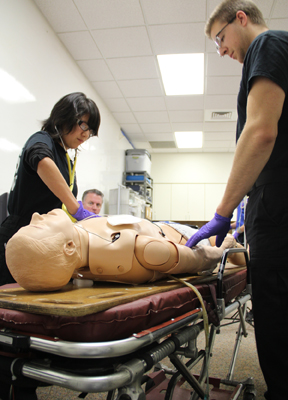COM paramedics earn 100 percent pass rate on national exam

Recently graduating from College of the Mainland, paramedic Jason Farrar is already serving his neighbors.
“I live in League City and I get to take care of my own community,” said Farrar, who
works for the League City EMS Department. “We have the entire spectrum (of calls)
from ‘I need help getting in bed’ to ‘my husband is not breathing.’”
Ferrar and his paramedic class earned a 100 percent pass rate on the first attempt
on the National Registry exam, an achievement met by only seven other programs in
the state.
In addition, the COM EMT-Basic class placed second among local programs on first try
with a 75 percent pass rate on the first attempt and 96 percent on the second.
To pass, students completed a written test and demonstrated their skills.
“Skills testing was a piece of cake,” said Farrar. “All of us passed (the written
test) in under 100 questions. The national registry test can go up to 150.”
Students in the COM EMT-Basic, EMT-Intermediate and EMT-Paramedic classes complete
classroom instruction and hands-on skills training reading ECGs, detecting heart rhythms
and diagnosing robotic manikins. They also conduct clinicals at University of Texas-Medical
Branch, Mainland Medical Center and Kindred Hospital, completing over 400 hours of
clinicals for the paramedic certificate alone.
“It’s not just sitting in a classroom and listening to somebody talk about their experiences.
You experience it,” said Farrar. “You’re the third person on the ambulance, and depending
on how well you do, they’ll hand over things to you.”
Graduates are in demand in emergency rooms, ambulances and fire departments. Students
may complete the EMT-Basic or EMT-Intermediate certificates and enter the workforce
or complete all three certificates in about a year for greater job opportunities and
higher salaries.
“There’s a lot of one-on-one training here that doesn’t exist in bigger programs,”
said EMS program coordinator Julianne Duncan. “We run students through scenarios.
We teach them how to think.”
Combining labs, classes and 72 hours of clinicals, the COM Emergency Medical Technician
(EMT) - Basic Program prepares students to administer first aid, safely transport
patients, and bandage and splint injuries. The hands-on program prepares students
to pass the National Registry EMT-Basic Certificate test. Evening and daytime classes
are available each semester.
Expanding on the skills demonstrated in the EMT-Basic Program, the EMT-Intermediate
Program teaches students how to insert a breathing tube and administer medications
intravenously. Daytime classes begin each fall and spring based on demand and prepare
students to pass the National Registry EMT-Intermediate Certificate test.
For more information on the COM EMT Programs, visit www.com.edu/ems or call 409-933-8198.
